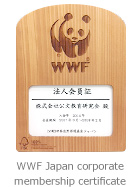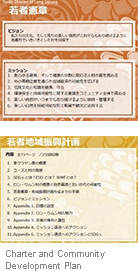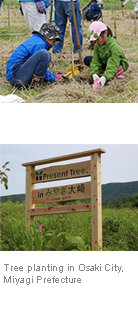Environmental Preservation with External Partners
Kumon Forest Foundation
The Kumon Group has made donations to various environmental organizations in the past, and in 2014 we established the Kumon Forest Foundation to create a system that allows us to continue providing support to organizations engaged in environmental conservation activities.
The Kumon Group uses a great deal of paper for learning materials. For this reason, we have made it one of our most important environmental goals to avoid wasting paper resources, and Kumon staff have been working together to use environmentally friendly paper, to reduce the use of paper other than for learning materials, and to recycle used paper.
In the future, we will strive to reduce our own environmental impact and to promote activities with external partners that protect forest resources through the Kumon Forest Foundation so as to contribute to the conservation of the global environment and the realization of a sustainable society.
Support for WWF Japan forest preservation activities

Through the Kumon Forest Foundation, the Kumon Group started to give our support to WWF Japan in 2014. WWF Japan is a member of the WWF Network, which is an organization for global environmental preservation operating in over 100 countries worldwide.
The WWF was established in Switzerland in 1961. Its mission is to protect biodiversity around the globe and to reduce the human burden on nature and wildlife. Forest preservation is one of them.
In addition to fieldwork, such as surveying and protecting rare species and reforestation through tree planting, WWF Japan works toward the goal of sustainable forest preservation by supporting local communities and the responsible purchasing of raw materials in Japan. It also conducts promotional and educational activities through the development of environmental educational programs and the organization of seminars and other events related to the environment.
WWF Japan supports forest preservation activities worldwide through its global network and also works on environmental education. Through education, Kumon also aims to make contributions to local communities and countries around the globe. Therefore, since we understand their activities, we also decided to support WWF Japan.
1.ESD Activities in Indonesia
2.Forest conservation in the Mekong region
Participation in Reforestation Activities through the Tree as a Present
All Instructors in Japan submit reports via the Center system and they order worksheets and items via the internet as part of the effort by the Kumon Institute of Education. We have set up a system where Instructors are given “Green Points” in this process. The Green Points that are earned can be donated to the NPO Environmental Relations at a rate of 1 Green Point = 1 yen. This NPO is engaged in tree planting activities called the “Present Tree.”
In FY2021, a total of 350,000 yen, including 160,000 yen in donations collected from Instructors, was donated to tree planting activities in Osaki City, Miyagi Prefecture. The planting site is located in the Onikobe district of Naruko Onsen, the area closest to the border between Yamagata and Akita prefectures, where the acceptance of grazing cattle was temporarily suspended due to the Fukushima Daiichi nuclear power plant accident. In order to return a portion of the former grazing land, where grazing had ceased due to reduced demand for pasture grass, to a natural forest, broadleaf tree saplings were planted. A forest of broadleaf trees was created near the source of the Eaigawa River, located in the Naruko Onsen Gorge, to promote water that will enrich the rice production area downstream.
Together with the Instructors of the Centers nationwide we will continue our efforts to reduce paper usage through our Green Points activities and we will participate in the forest preservation activities via the tree as a present.
- Environmental Management
of the Kumon Group - Environmental Philosophy and Environmental Policy,
and environmental promotion system
Kumon's
Environmental
Activities
- Environmental
Management of
the Kumon Group - 2021 Activities and
Environmental Data - Environmental
Communication - Kumon's Environmental
Activities Spreading
throughout the World - Environmental Preservation with External Partners


